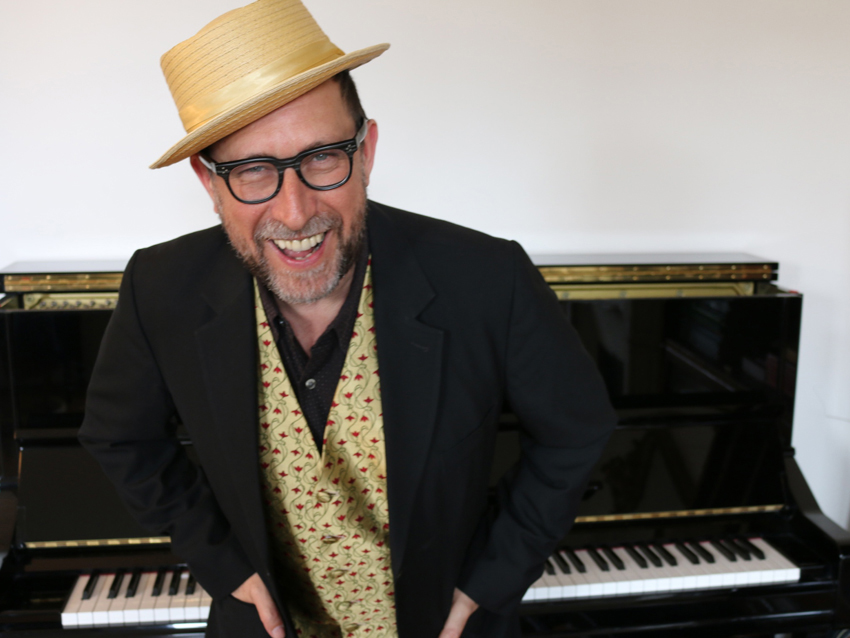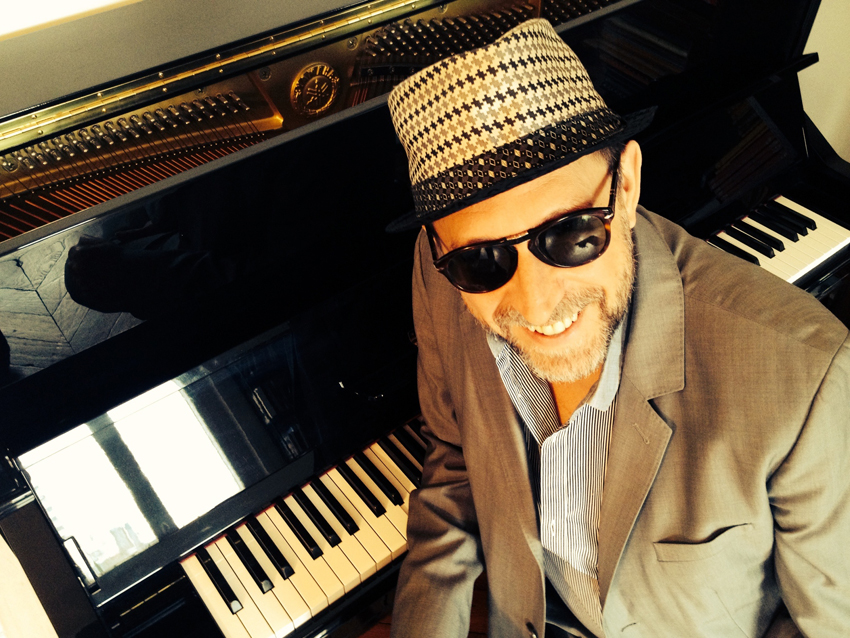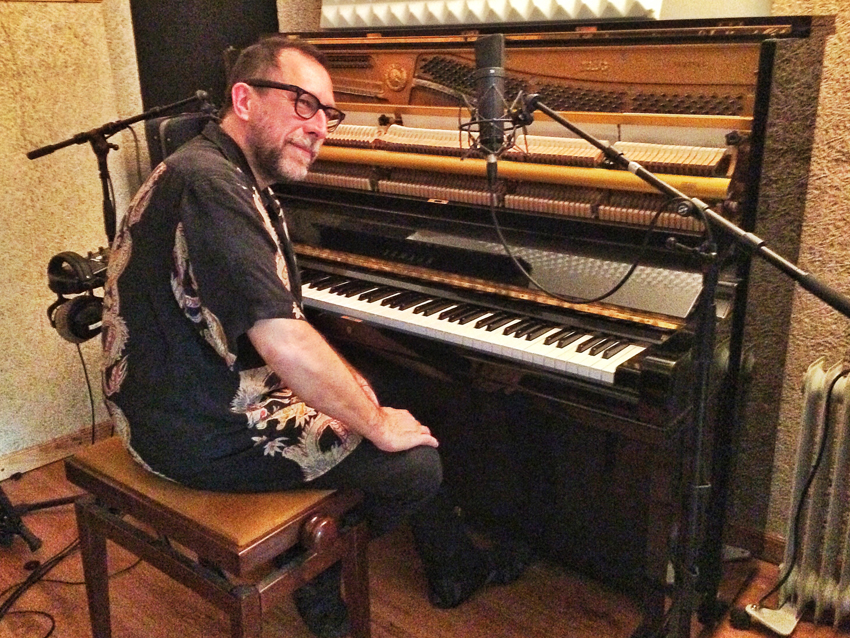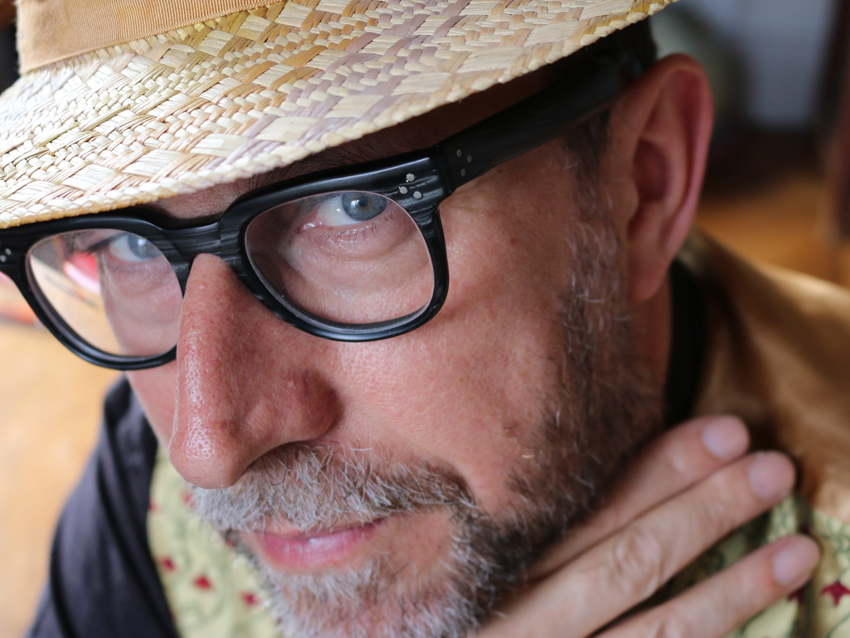
Steve Nieve's top 5 tips for keyboardists
For the past 37 years, as a member of The Attractions and now The Imposters, Steve Nieve has performed, arranged and brought to new heights the music of Elvis Costello. So what did the keyboard virtuoso and Rock Hall Of Famer choose to do on his just-wrapped mini-tour of the US? He performed the music of – you guessed it – Elvis Costello.
"I know, it might have struck some people as a little odd at first," Nieve says with a laugh. "The truth of the matter is, it was quite fresh, really. I purposely chose to do some songs that I wasn’t a part of when they were put out. I took some selections from The Juliet Letters, Spike and Mighty Like A Rose. That gave me some good challenges. It was interesting going through the string quartet music and transposing that to the piano."
To prepare for the tour, which featured singer Tall Ulysse as a special guest (Ulysse is a part of the Steve Nieve Band, along with guitarist Francois Poggio), Nieve looked through old Attractions and Imposters setlists for deep cuts and obscure gems. "I found some new ways to perform some of the numbers," he says. "I rearranged everything, even changing the keys for certain tunes. Because I was no longer restricted to the tonality of one singer, I’ve discovered a few new things in the songs by playing them in different keys. The whole thing was a lot of fun."
When Nieve, who studied at the Royal College of Music, joined The Attractions in 1977, his considerable musical pedigree was in stark contrast to that of the self-taught Costello. "In a funny and dramatic way, our differences and talents were perfect for each other," Nieve observes. “I was a schooled player but a very bad student, whereas Elvis was a self-taught musician but a very good student. I just wanted to get away from the Royal College Of Music and be a keyboard player in a rock band, which turned out to be a different kind of training."
And Nieve's musical expertise eventually rubbed off on his bandleader: “After I made all the arrangements on Imperial Bedroom, Elvis went somewhere to learn how to write music down on paper. He studied with a professor and worked quite hard at it. Now he’s able to write his own arrangements. He's really quite amazing."
In addition to future work with Elvis and The Imposters as well as the Steve Nieve Band, Nieve is planning a series of albums in which he pays tribute to some of his musical heroes. “Steve Nieve Plays Brian Eno – I’d love to do that next. And Nina Simone is a pianist I adore, so I’m working on that. I’m also interested in writing some film scores, so I’m looking into that. I like working with a wide variety of music. Being complacent just definitely isn't in my nature."
On the following pages, Nieve offers his top five tips for keyboardists. "Whatever your level of playing ability, whether you're accomplished or just starting out, there are a few things that I've picked up along the way that might help. I know they've increased my musical vocabulary and fed my interest a great deal."

Go backward rather than forward
“I think there was a time when we were very interested in experimenting with technology. As things were being developed, we felt as though we had to stay on the cutting edge.
“I was one of the first people to have an Emulator, for example. When we did Imperial Bedroom, the Emulator 1 had just come out, and I bought one of those at vast expense. We used it on the road so we could recreate some of the orchestral parts on the record.
“Now we don’t really do that, and in fact, I think it’s important to go back and look at some of the keyboards that came out a while ago and are no longer being built. You’re bound to find something interesting. I’ve gotten into vintage equipment from poking around on various websites. It’s a lot easier to find stuff than it once was.
“It’s also good to go back to some of the more basic keyboards because they help you expand your creativity. If you don’t have an endless menu of possibilities in front of you, something that can just do everything, you make to make stuff happen on your own. That's a lot more fun in the long run."

Play the same piece of music in different keys
"That's what I've been doing on this tour. It’s a wonderful way of massaging your fingers and your mind. You run into new possibilities with the same music. You might even find that the 'new way' of playing a song is the better way.
"When you’re learning a song, transpose it many times. Try playing it in a minor key if it’s written in a major key, and vice verse. There’s a song on Elvis’ album The River In Reverse called Ascension Day, which is essential Tipitina by Professor Longhair in a minor key instead of a major key. Elvis just wrote words over that.
“Transposition can be a great exercise. Not only does it help your overall musicianship, but you might even get a new song or two out of it.”

Read music on paper
“This will take you some time if you’re starting out cold. It’s like learning a new language at first, particularly if you’re not a kid – children pick things up like second nature. But it’s not impossible to learn, and once you do it’s like the difference between somebody who can read words and somebody who can't.
“Reading music can free your mind up, expand your creativity, and it also allows you to sit down and write something without even having an instrument in front of you. Think of all the possibilities!
“And for many musicians, being able to read sheet music can give you a real edge when it comes to being employable. Somebody hands you a piece of paper and you can go, ‘Oh, right,’ and you’ll be able to play it. You can study a song on a plane or wherever and be able to hear it in your head. You don’t know how cool that is until you can do it – trust me.”

Keep a piece of classical music around
“There’s a piece of classical music that I always use as an exercise. It’s by Bach, and it’s called The Goldberg Variations. I carry it around with me and warm up before shows with it. It’s very difficult, and I still can’t really play it, so it’s a goal that I have. One day I hope to be able to play it well, and then I’ll have to find something else that’s much harder.
“Warm up with scales that really stretch out your fingers. There are certain scales that give your fourth and fifth fingers a real workout, and if you warm up with those before a gig or a session, anything else you might be called upon to play will seem like a breeze.”

Constantly keep your ears open
“You should listen to lots of different types of music and seek out new artists. If's fine to have a particular favorite genre of music, but if you stick to only that, you're going to limit your creativity.
“Listen to young people, especially – a lot of musicians and music fans tend to stick with the music they grew up with. But the notion that 'it's all been done before' really isn't true. Recently, I heard a keyboard player named Nils Frahm. He’s got an album called Felt that really impressed me. He’s also got a track called Amber on an EP that he did, and I love that one.
“When I read an interview with him, he talked about some people that he liked, and so that led me to check them out. This is the kind of thing that just snowballs; before you know it, you’ve discovered several people just because of the one guy. I love that aspect of music. It never gets old.”
Joe is a freelance journalist who has, over the past few decades, interviewed hundreds of guitarists for Guitar World, Guitar Player, MusicRadar and Classic Rock. He is also a former editor of Guitar World, contributing writer for Guitar Aficionado and VP of A&R for Island Records. He’s an enthusiastic guitarist, but he’s nowhere near the likes of the people he interviews. Surprisingly, his skills are more suited to the drums. If you need a drummer for your Beatles tribute band, look him up.
